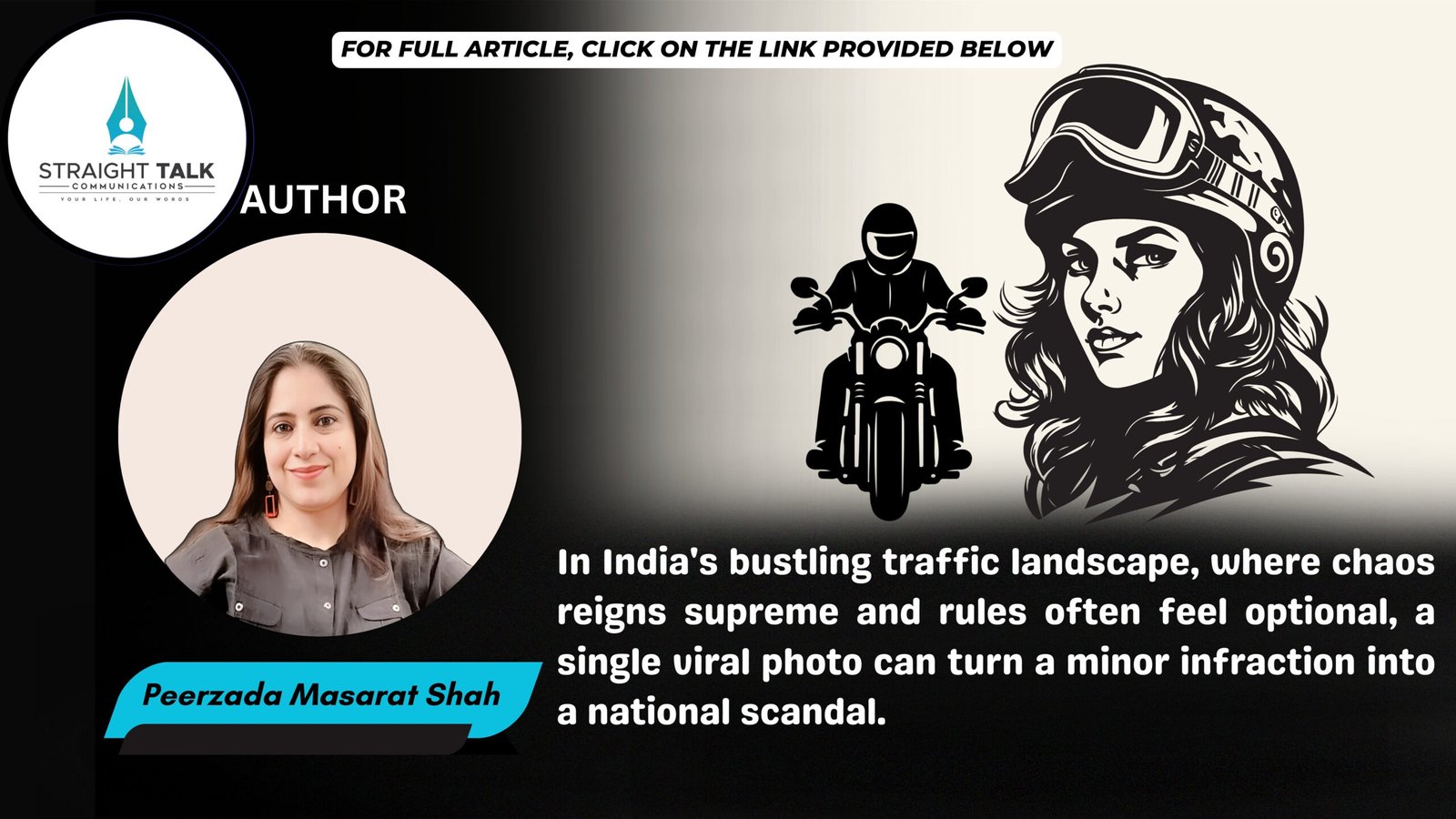Helmet Hypocrisy: Unequal Roads for Women Riders in India’s Viral Justice Era

Promote awareness campaigns that celebrate women riders without caveats. And for riders: helmet up, license ready—safety first, stereotypes second.
Peerzada Masarat Shah
In India’s bustling traffic landscape, where chaos reigns supreme and rules often feel optional, a single viral photo can turn a minor infraction into a national scandal. Take the recent case of a young woman on a Royal Enfield, captured helmet-free in a flowing teal outfit against hilly vistas. What started as a picturesque moment escalated into outrage, police seizure of her bike, and fines for lacking both helmet and license. As an observer of this digital drama, I see it not just as a safety lapse, but a symptom of deeper hypocrisy: selective enforcement amplified by gender bias, where women on wheels become prime targets for moral policing while systemic issues persist unchecked.
Let’s dissect this. Helmets aren’t mere accessories; they’re lifesavers, mandated since 2019 amendments to the Motor Vehicles Act, with fines starting at ₹1,000. Licenses ensure riders can handle the road’s unpredictability. Yet, why does this woman’s violation spark such fervor? The answer lies in a cocktail of virality and sexism. Social media transforms oversight into spectacle, but the lens sharpens on women, blending admiration for their “boldness” with judgment for defying norms. Men committing the same? Often a shrug or quick fine—if noticed at all.
Real-world examples abound. In June 2025, a Noida couple’s viral video showed them hugging on a speeding bike, both sans helmets, drawing a staggering ₹53,500 fine from police.
The stunt was reckless, no doubt, but the woman’s prominent role in the clip fueled memes and debates labeling it “female irresponsibility,” overshadowing the male rider’s equal culpability. Contrast this with a 2023 Ghaziabad incident where two male cops patrolled helmet-free, only fined ₹1,000 after women citizens chased them down and filmed the hypocrisy.
Here, the enforcers themselves flouted rules, yet the response was measured—no nationwide shaming.
This pattern isn’t anomalous. Just last month, a viral roadside video captured a biker confronting a female police officer riding pillion without a helmet; she claimed otherwise, but the double standard was evident—ordinary citizens face fines, while authorities evade scrutiny.
In Srinagar recently, traffic police seized a female biker’s vehicle and fined her for helmet-less riding, presenting her in court after a video went viral.
Meanwhile, a July 2025 report from Odisha highlighted a young woman performing stunts sans helmet on a busy route, adding to the tally of amplified female cases.
These incidents reveal a bias baked into enforcement. Studies show gender stereotypes label women as “worse drivers,” yet data contradicts this: men are involved in more accidents due to higher exposure and risk-taking.
A Quora discussion echoes why police might hesitate with female offenders: uncertainty in interaction or a paternalistic view that women are “safer” in vehicles.
This leniency flips to hyper-vigilance when virality kicks in, especially for women challenging male-dominated spaces like motorcycling.
Consider broader implications. India’s roads claim over 150,000 lives annually, with helmet non-compliance linked to 40% of two-wheeler deaths. Yet, enforcement is patchy—potholes, illegal racing, and triple-riding thrive without viral prompts. When a 2023 UP couple hugged on a bike (again, no helmets), they faced an ₹8,000 fine only post-video.
But in cases like the Rapido accident in July 2025, where a woman passenger recorded her crash after the rider dismissed helmet needs, the focus shifted to victim-blaming rather than systemic failures.
This selective outrage perpetuates inequality. Women entering “male” domains like biking face extra scrutiny, as noted in gender-sensitive policing reports.
It’s not just traffic; biases seep into law enforcement overall, with women officers and victims often sidelined.
Research on traffic attitudes shows women judge violations more harshly than men, yet they’re disproportionately judged when erring.
The solution? Uniform enforcement, not social media-driven justice. Train police to shed biases, as suggested in studies on gender-neutral policing.
Promote awareness campaigns that celebrate women riders without caveats. And for riders: helmet up, license ready—safety first, stereotypes second.
Ultimately, these viral takedowns distract from real reforms. Until enforcement is blind to gender and virality, India’s roads will remain unequal. Women, keep revving— but let’s demand a fairer ride for all.
(The views are of the author and not that of the Straight Talk Communications)







